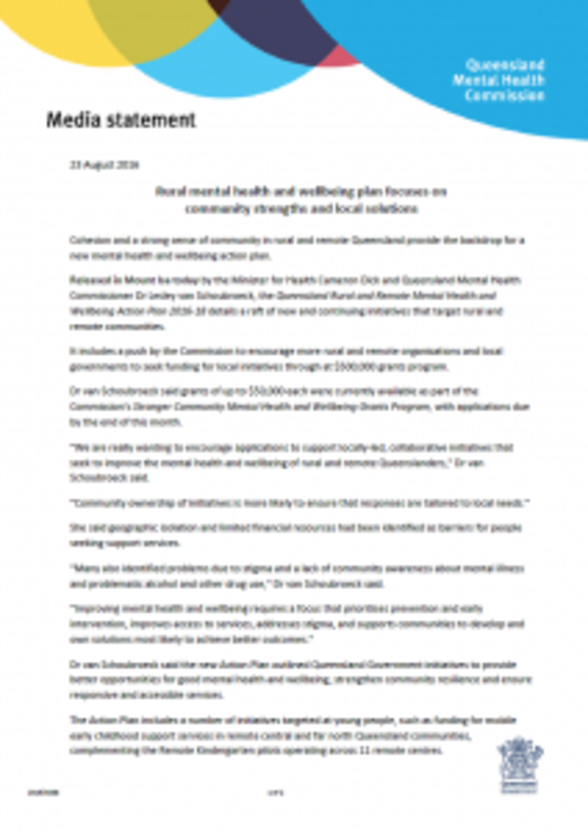Cohesion and a strong sense of community in rural and remote Queensland provide the backdrop for a new mental health and wellbeing action plan.
Released in Mount Isa today by the Minister for Health Cameron Dick and Queensland Mental Health Commissioner Dr Lesley van Schoubroeck, the Queensland Rural and Remote Mental Health and Wellbeing Action Plan 2016-18 details a raft of new and continuing initiatives that target rural and remote communities.
It includes a push by the Commission to encourage more rural and remote organisations and local governments to seek funding for local initiatives through at $500,000 grants program.
Dr van Schoubroeck said grants of up to $50,000 each were currently available as part of the Commission's Stronger Community Mental Health and Wellbeing Grants Program, with applications due by the end of this month.
"We are really wanting to encourage applications to support locally-led, collaborative initiatives that seek to improve the mental health and wellbeing of rural and remote Queenslanders," Dr van Schoubroeck said.
"Community ownership of initiatives is more likely to ensure that responses are tailored to local needs."
She said geographic isolation and limited financial resources had been identified as barriers for people seeking support services.
"Many also identified problems due to stigma and a lack of community awareness about mental illness and problematic alcohol and other drug use," Dr van Schoubroeck said.
"Improving mental health and wellbeing requires a focus that prioritises prevention and early intervention, improves access to services, addresses stigma, and supports communities to develop and own solutions most likely to achieve better outcomes."
Dr van Schoubroeck said the new Action Plan outlined Queensland Government initiatives to provide better opportunities for good mental health and wellbeing, strengthen community resilience and ensure responsive and accessible services.
The Action Plan includes a number of initiatives targeted at young people, such as funding for mobile early childhood support services in remote central and far north Queensland communities, complementing the Remote Kindergarten pilots operating across 11 remote centres.
It also includes a commitment to roll out a tele-triage service (1300 MH CALL) across the State, linking individuals with mental illness, their carers, family and mental health services provided by Hospital and Health Services, seven days a week.
Snapshot of rural and remote mental health and wellbeing
While there is no consistent evidence that the rate of mental illness in rural and remote areas is greater than in other parts of the State, there is evidence of greater vulnerability to poor mental health and wellbeing, problematic alcohol and drug use, and suicide.
The suicide rate in rural and remote Queensland exceeds that of other parts of the State. Between 2006 and 2010, Queenslanders living outside of Brisbane and other urban centres were more likely to suicide.[1]
The level of risky alcohol consumption is also higher in rural and remote communities.[2] Similarly, people living in remote and very remote communities are more likely to smoke tobacco daily and use cannabis and methamphetamines than people living in major cities.[3]
About the Action Plan
The Queensland Rural and Remote Mental Health and Wellbeing Action Plan 2016-18 was developed by the Queensland Mental Health Commission following input from service providers and community members through feedback to a discussion paper released in April, and during visits to Mackay, Longreach and Barcaldine.
The Commission will monitor and report on implementation of the Action Plan to ensure continual improvement and to address emerging issues. A Queensland Rural and Remote Mental Health and Wellbeing Reference Group will meet twice a year and the Commission will host roundtable forums in rural and remote communities during the life of the Action Plan.
Read the Queensland Rural and Remote Mental Health and Wellbeing Action Plan 2016-2018
[1] 17.1 per 100,000 people, compared to 10.8 per 100,000 in the Brisbane Statistical Division and 12.8 per 100,000 in other urban centres. Source: ABS 2012 Suicides, Australia, 2010 Cat. 3309.0
[2] Nationally, people living in remote and very remote communities are two times more likely as those living in cities to drink alcohol in risky quantities, placing them at risk of short and long-term harm.
Source: Australian Institute of Health and Welfare (2014), National Drug Strategy Household Survey
[3] ibid
-
 Rural mental health and wellbeing action plan (PDF, 274.98 KB)
Rural mental health and wellbeing action plan (PDF, 274.98 KB)

